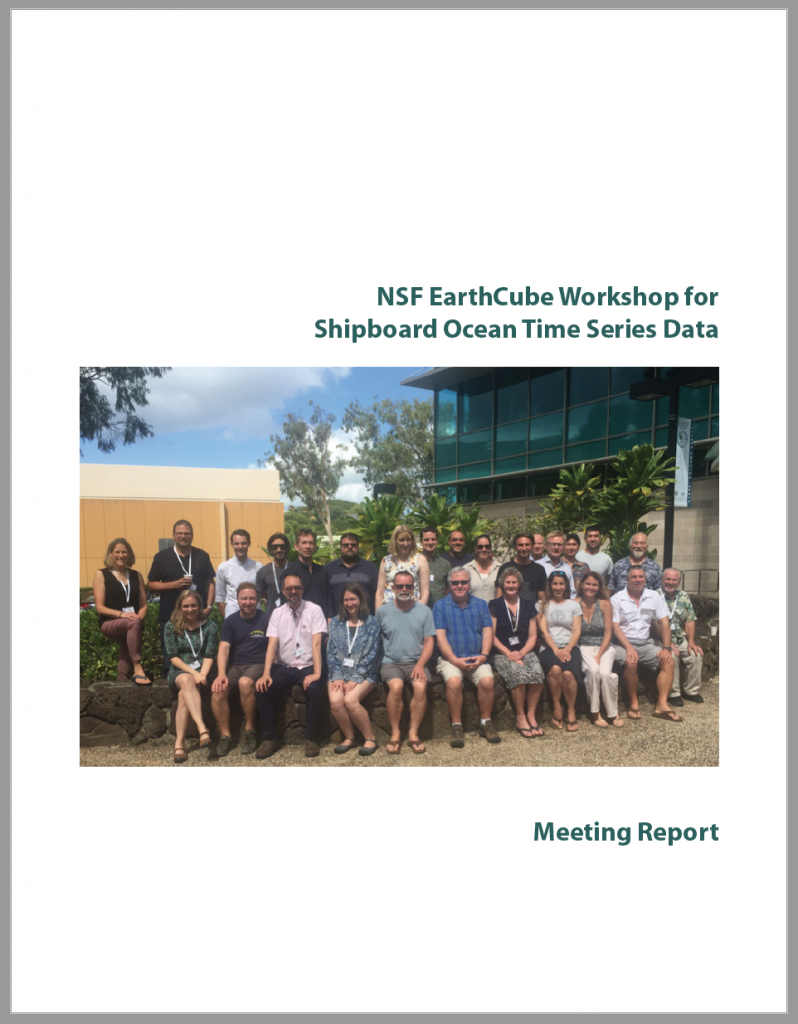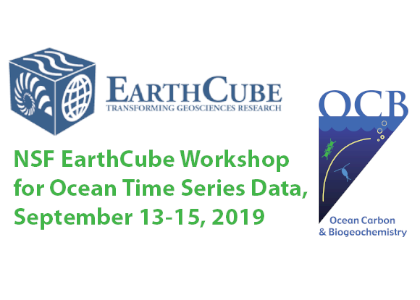Venue and Dates
Venue: C-MORE Hale Center at the University of Hawai’i Mānoa campus (PDF map), 1950 East West Road, Honolulu
The workshop commenced first thing in the morning on Friday, September 13 and ended at lunchtime on Sunday, September 15.
We are grateful to workshop sponsor NSF EarthCube and to the C-MORE Hale Center for hosting the workshop.
In preparation for this workshop, we developed a short survey to better understand the data challenges and needs of the ocean time series community.
NSF EarthCube Workshop for Ocean Time Series Data
September 13-15, 2019 (Univ. Hawai’i, C-MORE Hale Center)
Rationale: Data synthesis and modeling efforts across ocean time-series represents an important and necessary step forward in broadening our view of a changing ocean and improving our return on investment in ocean time-series. Despite the advances achieved over the past decade, significant barriers remain that hinder work across time-series, including issues related to data access, discoverability, and metadata reporting. Furthermore, incorporation of ocean time series data into ocean and earth system models is currently limited due to the lack of a standardized data format and user interface
Scope and Goals: To begin addressing this problem, the Ocean Carbon and Biogeochemistry (OCB) Program (us-ocb.org) convened a small workshop with funding from NSF EarthCube in September 2019 (in conjunction with OceanObs19). The objective of the workshop was to conduct a gap analysis to identify missing data infrastructure that would increase time series data availability and use. This workshop aimed to provide a much-needed forum for discussion of key issues and barriers surrounding data discovery, access, and interoperability.
Participants strategized a path forward on the development of a common framework for shipboard ocean time series data and metadata reporting, and data management resources. The overarching objective of this workshop was to move the shipboard ocean time series community toward a Findable, Accessible, Interoperable and Reusable (“FAIR”) model.
Topics of discussion included (but not limited to) the following ocean time series cyber-infrastructure challenges:
- Establishing a common data model for reporting core time series variables (e.g., definitions, vocabulary, units, precision, associated errors, etc.)
- Establishing standardized metadata reporting guidelines and required fields to facilitate data discovery and re-use
- Improving interoperability among different databases/portals
- Mechanisms to streamline and simplify data submission to oceanographic data management entities (e.g., automation of the time-series data acquisition/upload process)
- Vision and framework for a dedicated time-series data interface that also includes user-friendly visualization and computation options
- Meeting the needs of a broader range of users for data synthesis and information products emerging from ocean time-series
- Application of unique identifiers (such as DOIs) to data sets to enable citation and crediting of data providers
Ocean Time Series Data Workshop Agenda
September 13-15, 2019
C-MORE Hale Center, Honolulu, HI
Friday, September 13
8:00-9:00 Breakfast
9:00-9:30 Welcome (Heather Benway, OCB/WHOI) and introductions around the room
PLENARY SESSION
Introduction/overview talks (15 min. talks with 5 mins. for Qs)
9:30 EarthCube overview (Danie Kinkade, BCO-DMO/WHOI)
9:50 FAIR data principles and initiatives (ENVRI-FAIR, GO-FAIR, Enabling FAIR data, etc.) (Justin Buck, BODC/NOC and Steve Diggs, UCSD/SIO)
10:10 Time series data challenges that hinder science (Angelicque White, UH)
10:30-10:45 Break
Insights from current data models (12 min. talks with 3 mins. for Qs)
10:45 Interconnecting ocean time series efforts and frameworks (Laura Lorenzoni, NASA)
11:00 Moving towards FAIR data principles with ERDDAP (Kevin O’Brien, NOAA/PMEL)
11:15 The Ocean Observatories Initiative (OOI) approach to data and metadata (Wendi Ruef, Univ. Washington)
11:30 The international OceanSITES Eulerian Observing network (Johannes Karstensen, GEOMAR)
11:45 Use of controlled vocabularies: Potential applications to time series data (Adam Shepherd, BCO-DMO)
12:00 Integrated Carbon Observation System (ICOS) Ocean Thematic Centre (OTC) (Benjamin Pfeil, Univ. Bergen)
12:15 Ocean Best Practices (Johannes Karstensen, GEOMAR)
12:30-1:30 Lunch
Time series data integration and products (15 min. talks with 5 mins. for Qs)
1:30 Tools and approaches to facilitate data synthesis (Mark Schildhauer, NCEAS/UCSB)
1:50 International Group for Marine Ecological Time Series (IGMETS) overview and challenges (Laura Lorenzoni, NASA/USF)
2:10 Carbon relevant ship-based time series station synthesis – A data product pilot (Nico Lange, Univ. Bergen)
2:30-5:00 Small group discussions (participants self-select, coffee will be available if needing a break)
Group 1. Establishing a common data model for reporting core time series variables (e.g., definitions, vocabulary, units, precision, associated errors, etc.) (Chair: Justin Buck, Auditorium)
Group 2. Improving interoperability among different databases/portals for time series data (Chair: Mark Schildhauer, Agora Room)
5:00 Adjourn for the day, dinner on your own
Saturday, September 14
8:00-9:00 Breakfast
9:00 Group 1-2 report outs (15 mins. for each chair)
9:30 Group discussion
10:00-12:30 Small group discussions (participants self-select, coffee will be available if needing a break)
Group 3. Establishing standardized metadata reporting guidelines and required fields to facilitate time series data discovery and re-use (Chair: Angel White, Auditorium)
Group 4. Streamlining and simplifying time series data submission (Chair: Danie Kinkade, Agora Room)
12:30-1:30 Lunch
1:30 Group 3-4 report outs (15 mins. for each chair)
2:00 Group discussion
2:30-5:00 Small group discussions (participants self-select, coffee will be available if needing a break)
Group 5. Application of unique identifiers (such as DOIs) to enable time series data citation and credit to be attributed to data providers (Chair: Adam Shepherd, Table Outside)
Group 6. Meeting the needs of a broader range of users for data synthesis and information products emerging from ocean time-series (Chair: Laura Lorenzoni, Auditorium)
Group 7. Designing the ultimate time-series data interface that also includes user-friendly visualization and computation options (Chair: Lance Fujieki, Agora Room)
5:00 Adjourn for the day
6:30-8:30 Group dinner (Tiki’s Grill and Bar, 2570 Kalakaua Ave)
Sunday, September 15
8:00-9:00 Breakfast
9:00 Group 5-7 report outs (15 mins. for each chair)
9:45 Group discussion
10:15 Break
10:30 Participants assist chairs to finish compiling recommendations from small groups and discuss format/outcomes (participants self-select for one breakout topic to assist with)
11:30 Full group discussion (issues and remaining Qs, next steps, assignments, etc.) – considering the following:
- Format of recommendations (best practices) – Ocean Best Practices to codify once finalized
- EarthCube guidelines/requirements?
- Dissemination to time series community for feedback
- Opportunities for peer-reviewed publication(s)
12:00 Closing remarks and adjourn
12:30 Lunch
Jose Abella-Gutiérrez
jabella@cigom.org
Andrew Barna
abarna@ucsd.edu
Heather Benway
hbenway@whoi.edu
Annie Bourbonnais
abourbonnais@seoe.sc.edu
Justin Buck
juck@bodc.ac.uk
B. B. Cael
bbcael@hawaii.edu
Pat Caldwell
patrick.caldwell@noaa.gov
Fernando Carvalho Pacheco
fcarvalho.pacheco@gmail.com
Tara Clemente
tclement@hawaii.edu
Kim Currie
kim.currie@niwa.co.nz
Bjoern Fiedler
bfiedler@geomar.de
Lance Fujieki
fujieki@hawaii.edu
Ralf Goericke
rgoericke@ucsd.edu
Adriana Gonzalez Silvera
adriana.gonzalez@uabc.edu.mx
Joseph Gum
jgum@ucsd.edu
Dana Hunt
dana.hunt@duke.edu
Robert Izett
rizett@eoas.ubc.ca
David Karl
dkarl@hawaii.edu
Johannes Karstensen
jkarstensen@geomar.de
Danie Kinkade
dkinkade@whoi.edu
Nico Lange
Nico.Lange@uib.no
Ricardo Letelier
letelier@coas.oregonstate.edu
Laura Lorenzoni
laura.lorenzoni@nasa.gov
Mai Maheigan
mmaheigan@whoi.edu
David Nicholson
dnicholson@whoi.edu
Kevin O'Brien
kevin.m.o'brien@noaa.gov
Ben Pfeil
benjamin.pfeil@uib.no
Al Plueddemann
aplueddemann@whoi.edu
James Potemra
jimp@hawaii.edu
Janne-Markus Rintala
janne-markus.rintala@icos-ri.eu
Wendi Ruef
wruef@uw.edu
Mark Schildhauer
schild@nceas.ucsb.edu
Adam Shepherd
ashepherd@whoi.edu
Jim Todd
james.todd@noaa.gov
Ian Walsh
iwalsh@seabird.com
Angelicque White
aewhite@hawaii.edu
Timothy Whiteaker
whiteaker@utexas.edu
Heather Benway, Mai Maheigan, Mary Zawoysky (Woods Hole Oceanographic Inst./OCB)
Justin Buck (National Oceanography Centre/British Oceanographic Data Centre)
Rod Johnson (Bermuda Inst. Ocean Sciences/Bermuda Atlantic Time series Study)
Danie Kinkade, Adam Shepherd (Woods Hole Oceanographic Inst./BCO-DMO)
Laura Lorenzoni (NASA, Univ. South Florida)
Mark Schildhauer (Univ. California, Santa Barbara, National Center for Ecological Analysis and Synthesis, NCEAS)
D. Sarah Stamps (Virginia Tech Univ./EarthCube liaison)
Angelicque White (Univ. Hawai'i, Hawaii Ocean Time series)
Relevant resources
Armstrong EM, et al (2019) An Integrated Data Analytics Platform. Front. Mar. Sci. 6:354. doi: 10.3389/fmars.2019.00354
Bailey K, et al (2019) Coastal Mooring Observing Networks and Their Data Products: Recommendations for the Next Decade. Front. Mar. Sci. 6:180. doi: 10.3389/fmars.2019.00180
Benway HM, et al (2019) Ocean Time Series Observations of Changing Marine Ecosystems: An Era of Integration, Synthesis, and Societal Applications. Front. Mar. Sci. 6:393. doi: 10.3389/fmars.2019.00393
Buck JJH, et al (2019) Ocean Data Product Integration Through Innovation-The Next Level of Data Interoperability. Front. Mar. Sci. 6:32. doi:10.3389/fmars.2019.00032
deYoung B, et al (2019) An Integrated All-Atlantic Ocean Observing System in 2030. Front. Mar. Sci. 6:428. doi: 10.3389/fmars.2019.00428
EarthCube Resources:
- EarthCube Resource Registry Presentation - https://drive.google.com/file/d/1dwIUliAurfFstWRSiY74UBoUSaJYlVvc/view
- Main GitHub Organization - https://github.com/earthcubearchitecture-ecresourcereg
Kaiser BA, et al (2019) The Importance of Connected Ocean Monitoring Knowledge Systems and Communities. Front. Mar. Sci. 6:309. doi: 10.3389/fmars.2019.00309
Pearlman J, et al (2019) Evolving and Sustaining Ocean Best Practices and Standards for the Next Decade. Front. Mar. Sci. 6:277. doi: 10.3389/fmars.2019.00277
Snowden D, et al (2019) Data Interoperability Between Elements of the Global Ocean Observing System. Front. Mar. Sci. 6:442. doi: 10.3389/fmars.2019.00442
Steinhoff T, et al (2019) Constraining the oceanic uptake and fluxes of greenhouse gases by building an ocean network of certified stations: the ocean component of the Integrated Carbon Observation System, ICOS-Oceans. Front. Mar. Sci. 6, doi: 10.3389/fmars.2019.00544
Tanhua T, et al (2019) Ocean FAIR Data Services. Front. Mar. Sci. 6:440. doi: 10.3389/fmars.2019.00440






